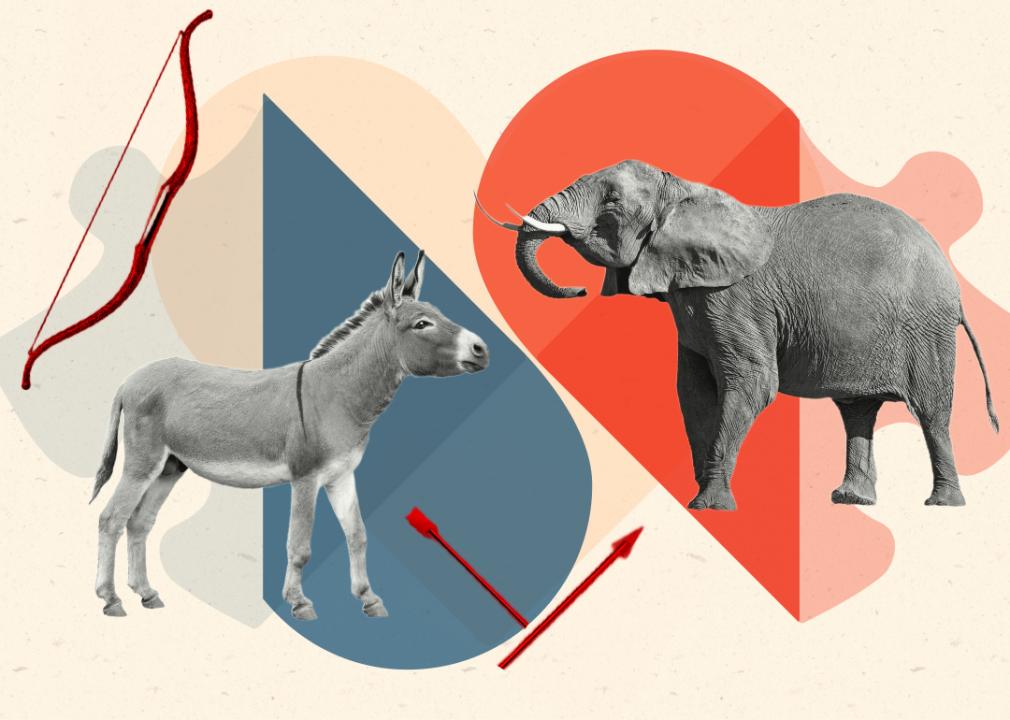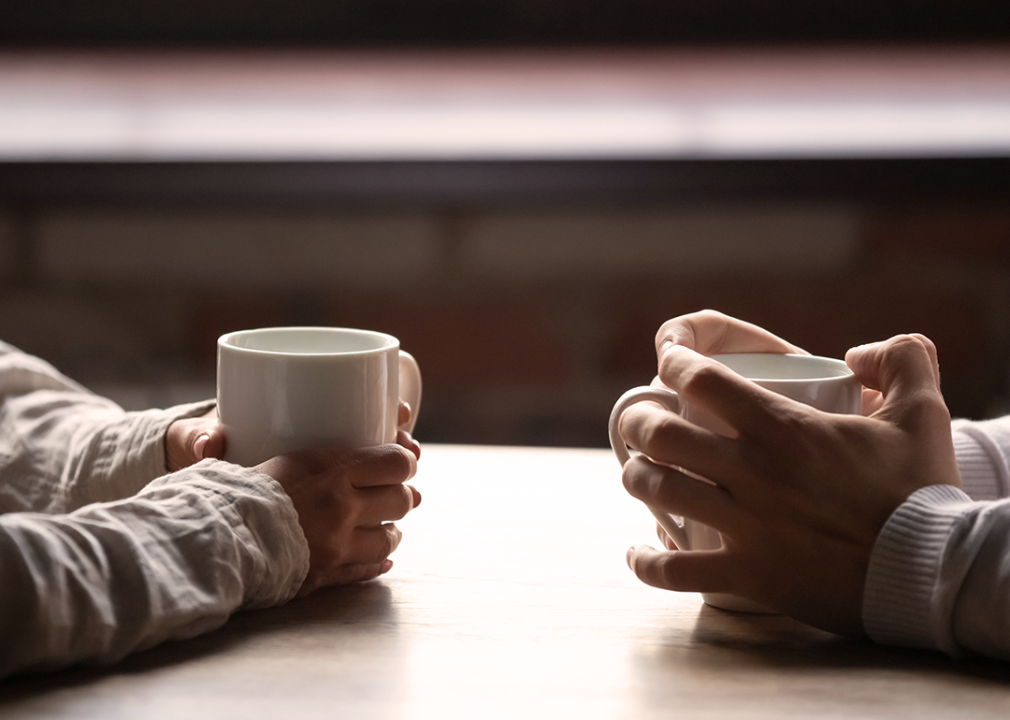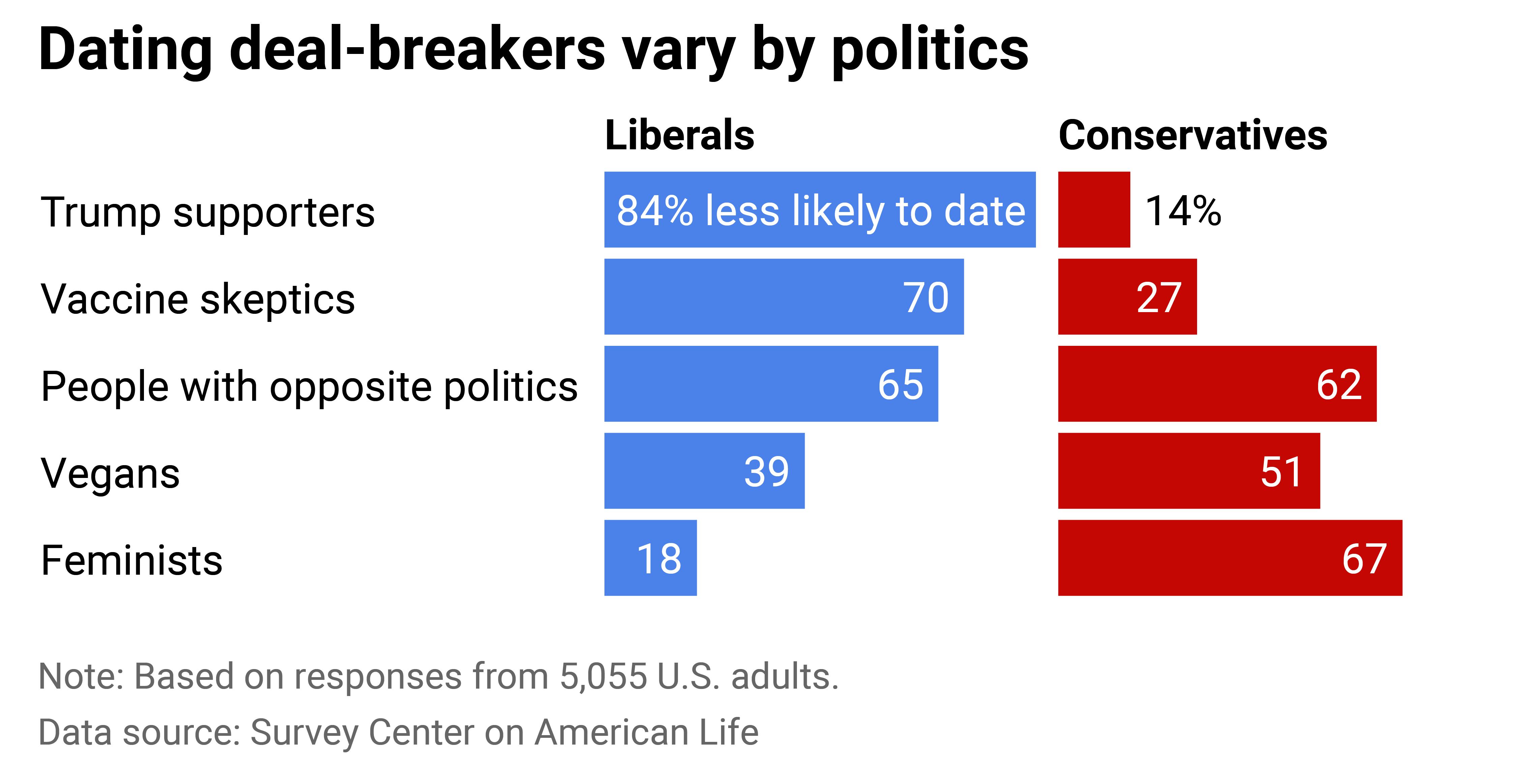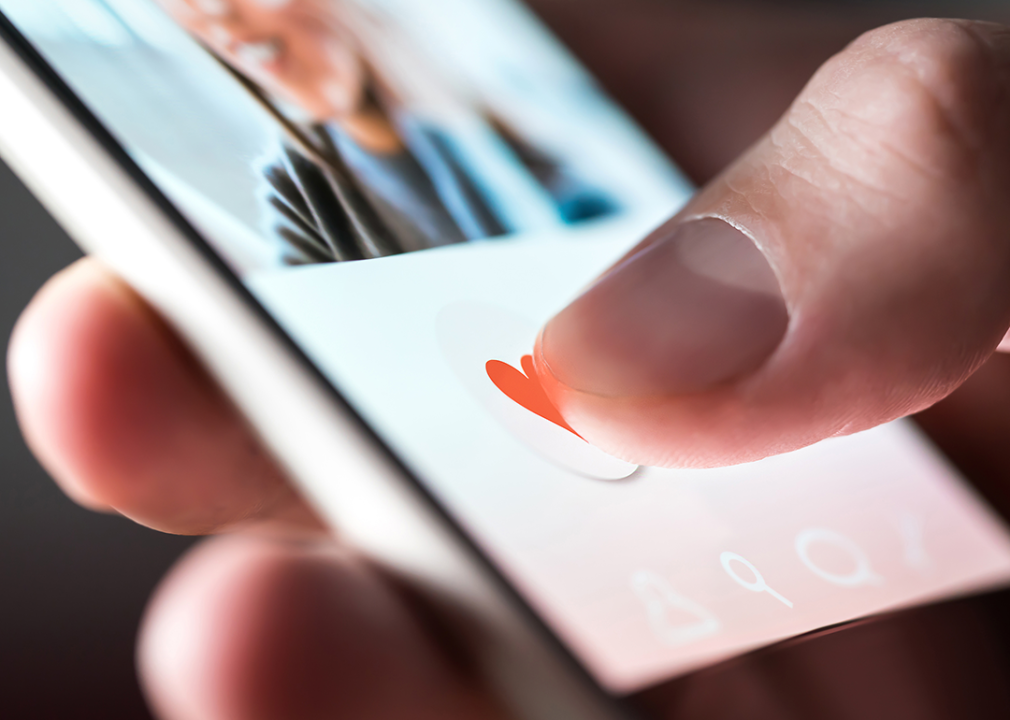Are politics Americans' biggest dating deal-breaker?
Stacker used data from the Survey Center on American Life and consulted experts to explore how politics are shaping modern-day romantic relationships.

Data and polling research gathered by NBC illustrate America's increasing political polarization that even has think tanks worried. There is no question that political issues have divided the states, but has it also gotten in the way of romantic relationships?
To better understand how politics have affected Americans' personal lives, Stacker explored how politics are shaping modern-day romantic relationships using data from the Survey Center on American Life.
In 2022, the American Enterprise Institute's Survey Center on American Life conducted a nationwide survey to learn about dating preferences among Americans, including how the country's changing political landscape might shape romantic relationships.
The survey, called the American Perspectives Survey, surveyed more than 5,055 adult respondents—a mix of people who were married, in relationships, or single—about what they consider when looking for a romantic partner, touching upon matters like their educational background, living situation, location proximity, and political ideology among other things.
Daniel A. Cox, the director of the survey, and his team found that respondents now place more value on their potential partner's political views. The shift was more pronounced among younger survey respondents, or those between 18 and 30 years old.
"One of the things that has, I think, elicited some of the strongest reactions of stuff that I've written recently is this growing political divide between young men and young women," Cox, who also serves as a senior fellow at the American Enterprise Institute, said in an appearance on the think tank's youth-focused podcast, The Campus Exchange. "It wasn't that long ago, certainly during the Obama era, where young men and women were much more politically aligned. And in the wake of #MeToo or Trump or the overturn of Roe, I think you're seeing a really significant shift in the political priorities and predispositions of young women."
The survey involved participants from all 50 states plus the District of Columbia. The data itself was adjusted for different demographic characteristics. Sample weighting in the survey also used an iterative proportional fitting process that balances the distributions of all variables. In addition to the general questionnaire, 21 of the respondents were selected for further in-depth one-on-one interviews to share more about their preferences in dating.
You may also like: The latest 2024 state ballot measures — 16 new measures certified in March
Interpolitical relationships are on the decline

As the country becomes more polarized politically, a potential partner's political beliefs are now among the key traits taken into consideration by Americans on both sides of the aisle. This shift was observed anecdotally leading up to the 2016 U.S. elections and after; some dating apps also adjusted to this dating trend by adopting special photo filters and features so users could suss out political mismatches.
That shift in dating dynamics is backed up by data. The 2023 American Perspectives Survey found that nearly two-thirds of Democrats were less likely to date a Republican while more than 3 in 5 Republicans stated they would be less likely to date a Democrat. As such, romantic relationships between people with differing political ideologies may be less likely than in the past.
"What is political is also personal, and what is happening in the macro profoundly shapes the micro," Alexandra Solomon, a clinical psychologist at The Family Institute at Northwestern University, told The Hill.
When it comes to marriage, the survey found that more respondents are marrying people who are different from themselves in terms of race and/or religion. Studies show that interracial marriages and interfaith marriages are more common.
However, a political divide between a couple may be too large of a gap to bridge. Americans are becoming less inclined to commit to marrying someone from a different political ideology, making politically mixed marriages "extremely rare," according to a 2020 analysis by the Institute for Family Studies based on data from the nationwide American Family Survey, which studies 3,000 Americans. The same analysis shows roughly 1 in 25 marriages are between Democrats and Republicans—a slight decline compared to the data from three years prior.
Dating differences between Democrats and Republicans are more pronounced on hot-button partisan issues

The shift away from interpolitical romance is evident when it comes to specific political issues, where Democrats and Republicans differ greatly in dating preferences. On abortion, only 1 out of 7 American Perspective Survey respondents said it would be "impossible" to date someone with a different belief on the issue. Still, reproductive rights remain a key dating consideration among liberal-leaning women: nearly 3 in 5 liberal women respondents agree that it would be "impossible" or at least "very difficult" to date someone who has a different stance on abortion. By comparison, about 2 in 5 conservative women said it would be "impossible" or "very difficult" to date someone who did not feel the same way about abortion.
Aidan Grogan from Palos Heights, Illinois, identifies as a Christian. He told the Chicago Sun-Times that, for him, abortion isn't a political issue, but rather a "spiritual or metaphysical" one. While Grogan may think twice about dating someone with differing views on abortion, survey results show that a potential partner's stance on abortion is generally less of a consideration for men on either side of the political spectrum. One-third of liberal men and just slightly under one-third of conservative men, respectively, say they would have a huge issue dating someone who didn't share their views on the matter in the American Perspective Survey.
There is also a wide political divide on dating self-identified feminists. Nearly 7 out of 10 conservatives said in the same survey that they would be less likely to date a self-identified feminist compared to fewer than 1 out of 5 liberals who said they would be less likely to date a feminist. In fact, more than a third of liberals said they would be more likely to date someone who is a feminist.
How a romantic partner feels about Donald Trump is another make-or-break matter for partisans. According to Wakefield Research, a market research firm that performed a 2017 survey on married couples and how Donald Trump affected their relationships, about a third of married couples in the survey said they would consider getting a divorce if their spouse supported Trump.
A potential partner's views on Donald Trump is an important consideration among Democrats. The American Perspective Survey found that more than 4 out of 5 Democrats said that supporting Trump would make them less likely to consider dating someone. Meanwhile, about 1 in 3 Republicans stated they were more likely to date a person who supported Trump, and only 1 out of 7 Republicans would be less likely to date a Trump supporter.
Issues like vaccines and veganism are becoming deal-breakers, too

There are dating considerations among partisan Americans that have become politicized beyond hot-button topics.
Vaccinations, for example, are an essential part of public health, but it has become politicized due to stark ideologies that have bled into public health affairs following the COVID-19 pandemic. What used to be considered a simple medical decision is now perceived as a manifestation of one's political ideology. That, in fact, may be the case for many Americans—researchers at the Kaiser Family Foundation found that political affiliation was by far the strongest vaccination predictor among all demographic factors, according to the group's 2021 study.
In dating, a person's views on vaccinations carries weight among Democrats and Republicans. Seven out of 10 Democrats were less likely to date a vaccine skeptic, compared to nearly 3 out of 10 Republicans who said the same in the American Perspectives Survey.
Another topic that the American Perspective Survey explored is whether Democrats and Republicans consider veganism in their dating preferences. This lifestyle of abstaining from animal-derived consumption has become synonymous with certain ideologies, which has in turn politicized it. However, there are growing public discussions around the inherent values of such a lifestyle, and whether that should be placed on par with other political movements that are focused on environmental concerns.
Generally speaking, over half of the survey's respondents don't care whether their potential partner is a vegan or not. However, differences emerge when the survey data is broken down based on political affiliation. Conservatives are more hesitant about dating a vegan compared to liberals: just a little over half of conservatives compared to nearly 2 out of 5 liberals, respectively, reported having more reservations about dating someone vegan.
So what do Democrats and Republicans look for in a partner?

Given how much weight their romantic partner's political views hold for many Americans, it stands to reason that knowing what their partner is like as a person—including their political ideology—before jumping into a relationship with them is important.
This is increasingly true for younger Americans, who appear to be more interested in dating someone within their network of friends compared to older generations. The American Perspectives Survey data shows more than 2 out of 5 young adults knew their partner as a friend or close friend before they got involved romantically. By comparison, only about 1 in 5 seniors could claim the same before romantically connecting with their partner.
The politically fraught climate could make finding a compatible life partner even more difficult, it seems.
Combined with the hardening of political stances, some experts say we could see a significant impact on the future of romantic relationships in the country. Brad Wilcox, a sociologist who teaches at the University of Virginia and manages the National Marriage Project at the school, described the political polarization to Deseret News as "one more obstacle that stands in the way of dating and marriage."
There are worse things than politics to divide couples, however. Chief among them, according to the survey, is a potential partner smoking cigarettes, being unemployed, or living in another state.
Data reporting by Eliza Siegel. Story editing by Carren Jao. Copy editing by Tim Bruns.







